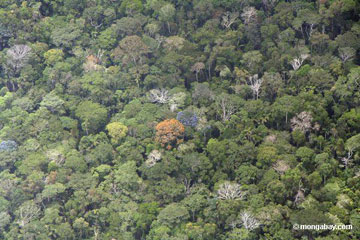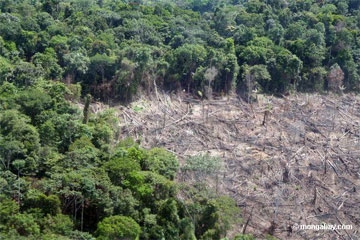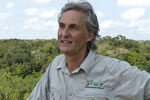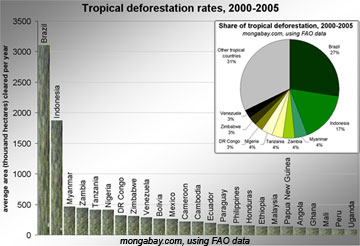UK government: rainforests are weapon against global warming
mongabay.com
October 14, 2008
New report is avoided deforestation equivalent of the Stern Review on climate change
Protecting tropical forests will simultaneously reduce carbon emissions, support poverty reduction and help preserve biodiversity and other forest services, says a new report commissioned by the British government.
The report — dubbed the "Eliasch Review" after the lead author, Johan Eliasch, a multimillionaire Swede who runs a sports equipment company and owns 162,000 hectares (400,000 acres) of rainforest in the Brazilian Amazon — takes a comprehensive look at the role forests can play in mitigating climate change. It concludes: "Urgent action to tackle the loss of global forests needs to be a central part of any future international deal on climate change"
 Climate Change: Financing Global Forests [PDF] |
Deforestation and land use change account for around a fifth of global greenhouse gas emissions — more than the entire transportation sector — but financial incentives (i.e. carbon markets) to reduce emissions from deforestation are presently excluded from international climate agreements. This may change at the next major round of climate talks in Copenhagen in 2009. Support for the concept — generally known as "avoided deforestation" — is being advanced by a wide range of interests on a number of fronts. The new report indicates that the U.K. government has thrown its weight into the effort, seeing the potential of avoided deforestation to be part of its portfolio of emissions-reducing mechanisms. The review cites research showing that beyond being a cost-effective way to help mitigate climate change, avoided deforestation offers a number of tangential benefits.
"Saving forests is critical for tackling climate change. Without action on deforestation, avoiding the worst impacts of climate change will be next to impossible, and could lead to additional climate change damages of $1 trillion a year by 2100," said Eliasch. "Including the forest sector in a new global deal could reduce the costs of tackling climate change by up to 50 percent and therefore achieve deeper cuts in emissions, as well as reducing poverty in some of the world’s poorest areas and protecting biodiversity."
"Deforestation will continue as long as cutting down and burning trees is more economic than preserving them. Access to finance from carbon markets and other funding initiatives will be essential for supporting forest nations to meet this challenge," he added.
 Amazon rainforest canopy in Peru. |
Eliasch's remarks echo those put forth by Prince Charles, who has recently launched his own save-rainforests-for-climate initiative, backers of an innovative plan to conserve the forests of Guyana for the ecosystem services they provide humanity, as well as a growing number of environmental NGOs, who have lately taken to championing avoided deforestation as potentially one of the best ways to finance rainforest conservation and rural development. The British government apparently agrees.
“With more than a billion of the poorest people on our planet dependent on forests to provide them with a livelihood, today's report highlights the challenges we face in reconciling the short-term interests of individuals with the global challenge of tackling climate change," said Douglas Alexander, International Development Secretary for the U.K.
Criticism
Critics of the concept say that avoided deforestation will let industrialized nations off the hook for climate change by allowing them to "offset" some of their emissions rather than reducing them. Further there are concerns over whether benefits will actually reach rural populations; "leakage", whereby carbon conservation in one area is undermined by deforestation in another; "permanence", whether a county can ensure that forest carbon savings are permanent; and determining how credits should be distributed between countries with high deforestation rates and countries with high forest cover but low deforestation rates.
Greenpeace, which has proposed its own non-market system for using forest conservation to slow climate change, and Friends of the Earth both blasted the proposal.
"Allowing forests to become a 'get out of jail' free card for the big polluters would be extremely bad news for the fight against climate change," said Andy Tait, Greenpeace's biodiversity of biodiversity, in a statement. "If Gordon Brown accepts these proposals he will give a green light to companies to use forest protection abroad as a cheap alternative to making the dramatic cuts in the industrial and energy sectors that we need here in the U.K."
“This scheme has the potential to cause even greater conflict over forests," said Tom Pickens, a campaigner with of Friends of the Earth, told the Times Online.
The report notes these these issues but nonetheless suggests that they can be addressed via an international framework on climate that involves stakeholders in tropical countries, as well to pushing for strict emissions reductions in industrialized countries.
"The international community has a role in ensuring that basic safeguards are in place for the people and places who are affected by a new system to reduce deforestation. Policies and programs to reduce deforestation should do no harm," stated the report. "The international community can help promote best practice and policies and measures that, as well as reducing deforestation, promote co-benefits such as poverty reduction and biodiversity protection and enhancement."
"Many forest nations will want to undertake policy and institutional reforms in order to create a governance environment in which sustainable land and resource management is possible and profitable. Clarifying and securing land tenure and user rights will be an essential part of this. The international community should provide urgent support for capacity building where necessary."
Leaders from the Coalition for Rainforest Nations, a group of tropical countries seeking compensation for forest conservation, also expressed optimism.

|
"Papua New Guinea welcomes the Eliasch Review as it highlights the fundamental role of carbon markets over the medium to long term while emphasizing the need for a comprehensive approach in the shorter term," said Sir Michael Somare, Prime Minister of Papua New Guinea and one of the initiators of the Coalition for Rainforest Nations. "Within the context of the current global financial instability, we must urgently identify mitigation strategies that are lower-cost and quickly implementable – reducing emissions from deforestation in developing countries offers exactly that potential. Accordingly, on behalf of the Coalition for Rainforest Nations, we will work closely with Prime Minister Brown to take forward the best ideas from this Review.”
“The Costa Rica experience supports many of the findings from the Eliasch Review – with dedicated resources, creative institutions and a sound legal framework, deforestation can be reversed and forest cover expanded," said Foreign Minister Bruno Stagno-Ugarte of Costa Rica, also a Coalition country. "For Costa Rica to be successful towards our goal of carbon neutrality by 2021, we will require international support to scale-up our efforts to conserve existing forests and increase reforestation and restoration activities. Only through an integrated approach to forestry, can we push back the effects of climate change. Today we have a historical opportunity to make things right and correct the mistakes of the past."
"As the world acknowledged last year in Bali, we cannot win the battle against climate change unless tropical forests are fully integrated within a post-2012 agreement. The necessary methodologies and technologies exist. What remains is capacity building and the mobilization of the necessary international resources," added Foreign Minister Hassan Wirajuda of Indonesia, a country that is the world's third largest greenhouse gas emitter when emissions from deforestation are included. "We look forward to working with the Government of the United Kingdom on the important issues of tropical forestry and climate change."
Conclusions
The Eliasch Review says that "an ambitious international climate change deal should aim to halve deforestation emissions by 2020 and make the forest sector carbon neutral by 2030 – with emissions from forest loss balanced by new forest growth."

|
The review notes that while "reducing deforestation rates significantly will require substantial finance… the net benefits of halving deforestation could amount to $3.7 trillion over the long term" in terms of the value of ecosystem services. It estimates that avoided deforestation ("deforestation and degradation (REDD)") could finance a 75 percent reduction in deforestation by 2030, while halving the cost of a 50 percent reduction (relative to 1990 levels) in global carbon emissions.
The report fails to note that as the owner of 162,000 hectares of rainforest in Brazil, Eliasch may benefit personally from any mechanisms that compensate landholders for maintaining their forest cover. Eliasch runs Cool Earth, a non-profit that sells forest carbon offsets to consumers.
Climate Change: Financing Global Forests. The Eliasch Review
Related articles
Indigenous people demand greater say in using forests to fight global warming
(10/8/2008) Indigenous leaders renewed their call for greater say in how tropical forests are managed to reduce greenhouse gas emissions, according to AFP.
Forest conservation can fight climate change and poverty
(10/8/2008) The Forests Dialogue — a coalition consisting of more than 250 representatives of governments, forestry companies, trade unions, environmental and social groups, international organizations, forest owners, indigenous peoples and forest-community groups — has issued guiding principles for including forests in climate change negotiations.
Cutting deforestation can fight climate change, reduce poverty and conflict
(9/24/2008) Forest conservation can play a critical role in efforts to reduce greenhouse gas emissions and alleviate poverty, said a prominent group of politicians, development experts, and environmental NGOs meeting in New York City to discuss U.S. climate policy. Organized by Avoided Deforestation Partners, an international policy group, the meeting sought to establish a strategy to highlight the global impact of deforestation and push for the inclusion of tropical forests in domestic climate policy. Attendees included leaders of WWF, the Nature Conservancy, Conservation International, World Vision, Oxfam, Mercy Corps, Care International, and the Union of Concerned Scientists; former Vice President Al Gore; Wangari Maathai, a Nobel Prize-winning activist from Kenya; Bharrat Jagdeo, president of the South American country of Guyana; and executives from a number of carbon-trading and financial firms. The event was hosted by veteran journalist Dan Rather.
WWF ends contentious debate, will now support effort to fight climate change by saving rainforests
(9/24/2008) WWF, one of the world’s largest environmental groups, says it will now support policy mechanisms that would compensate tropical countries for reducing carbon dioxide emissions generated by deforestation and forest degradation, according to remarks by the group’s president and CEO at an “avoided deforestation” meeting in New York.
Norway offers $1 billion towards saving the Amazon rainforest
(9/17/2008) Norway will donate up to a billion dollars to a Brazilian government fund that aims to protect the Amazon rainforest.
Old growth forests are giant carbon sinks, helping offset emissions
(9/11/2008) Old growth forests are important carbon sinks that help global warming, reports a study published in the journal Nature. The results run counter to claims by the forestry industry that old growth forests are carbon neutral or even net emitters of carbon dioxide.
Prince Charles says hedge funds could save rainforests
(9/11/2008) Prince Charles renewed his call to protect rainforests for the services they provide humanity. Speaking Wednesday at a black-tie dinner in London, Charles compared the need to protect forests to fighting a war.
Biofuels 200 times more expensive than forest conservation for global warming mitigation
(8/27/2008) The British government should end subsidies for biofuels and instead use the funds to slow destruction of rainforests and tropical peatlands argues a new report issued by a U.K.-based think tank. The study, titled “The Root of the Matter” and published by Policy Exchange, says that “avoided deforestation” would be a more cost-effective way to address climate change, since land use change generates more emissions than the entire global transport sector and offers ancillary benefits including important ecosystem services.
 |
Markets could save rainforests: an interview with Andrew Mitchell
(8/17/2008) Markets may soon value rainforests as living entities rather than for just the commodities produced when they are cut down, said a tropical forest researcher speaking in June at a conservation biology conference in the South American country of Suriname. Andrew Mitchell, founder and director of the London-based Global Canopy Program (GCP), said he is encouraged by signs that investors are beginning to look at the value of services afforded by healthy forests.
New plan would pay tropical countries for saving forests, regardless of level of threat
(7/24/2008) Deforestation and forest degradation account for around a fifth of global carbon emissions from human activities, but new policy measures are focusing reducing such emissions as a cost-effective way to fight global warming. While the concept — known as REDD for “Reducing Emissions from Deforestation and Degradation” — has found wide support from politicians, scientists, and environmentalists, there are lingering concerns over how to compensate countries that have extensive forest cover and low rates of annual forest loss, since payments are based on historical deforestation rates. A new proposal seeks to get around this issue by factoring in all the terrestrial carbon in a tropical landscape — regardless of level of threat it faces — and packaging it as a tradable commodity.
Forestry will play a critical role in slowing global warming
(6/12/2008) While reducing deforestation and forest degradation would pay great dividends in the fight against global climate change by eliminating up to a fifth of greenhouse gas emissions, other mechanisms can also enhance the capacity of forests to sequester carbon from the atmosphere, show researchers writing in this week’s issue of the journal Science.
Madagascar signs big carbon deal to fund rainforest conservation
(6/11/2008) Madagascar will sell more than nine million tons of carbon offsets to fund rainforest conservation in a newly established protected area. conservationists say the deal protect endangered wildlife, promote sustainable development to improve the economic well-being of people living in and around the park area, and help fight global warming.
Brazil’s Amazon conservation efforts worth $100 billion
(5/29/2008) A plan to protect large expanses of the Amazon rainforest could reduce carbon emissions by 1.1 billion tons by 2050, according to a study presented in Bonn, Germany at the UN Convention on Biological Diversity.
Forest carbon credits could guide development in Congo
(5/28/2008) An initiative to reduce greenhouse gas emissions by offering carbon credits to countries that reduce deforestation may be one of the best mechanisms for promoting sustainable development in Central Africa says a remote sensing expert from the Woods Hole Research Center (WHRC). Dr. Nadine Laporte, an associate scientist with WHRC who uses remote sensing to analyze land use change in Africa, says that REDD could protect forests, safeguard biodiversity, and improve rural livelihoods in Democratic Republic of Congo (DRC) and other Central African nations.
Greenpeace says carbon fund will save forests and climate
(5/20/2008) In a report unveiled today at the UN conference on biodiversity in Bonn, Greenpeace announced support for a plan to save tropical forests through a fund for carbon and other ecosystem services.
 |
Carbon market could fund rainforest conservation, fight climate change
(5/19/2008) A mechanism to fund forest conservation through the carbon market could significantly reduce greenhouse emissions, help preserve biodiversity, and improve rural livelihoods, says a policy expert with the Woods Hole Research Center (WHRC) in Massachusetts. In an interview with mongabay.com, WHRC Policy Advisor and Research Associate Tracy Johns says that Reducing Emissions from Deforestation and Degradation (REDD), a proposed policy mechanism for combating climate change by safeguarding forests and the carbon they store, offers great potential for protecting tropical rainforests.
Prince Charles calls for rainforest protection to fight climate change
(5/15/2008) Ending the destruction of tropical rainforests is the simplest step to helping address climate change, said Prince Charles in an interview with the BBC.
Al Gore’s investment firm bets that rainforest conservation will be profitable
(5/14/2008) Al Gore’s investment firm has signaled an interest in the emerging market for ecosystem services by taking an equity position in an innovative Australian financial company.
Papua signs REDD carbon deal to generate income from rainforest protection
(5/14/2008) The government of the Indonesian province of Papua has entered into an agreement with an Australian financial firm to establish a forestry-based carbon finance project on the island of New Guinea.
 |
U.S. climate policy could help save rainforests
(5/14/2008) U.S. policy measures to fight global warming could help protect disappearing rainforests, says the founding partner of an “avoided deforestation” policy group. In an interview with mongabay.com, Jeff Horowitz of the Berkeley-based Avoided Deforestation Partners argues that U.S. policy initiatives could serve as a catalyst for the emergence and growth of a carbon credits market for forest conservation. REDD or Reducing Emissions from Deforestation and Degradation is a proposed policy mechanism that would compensate tropical countries for safeguarding their forests. Because deforestation accounts for around a fifth of global greenhouse gas emissions, efforts to reduce deforestation can help fight climate change. Forest protection also offers ancillary benefits like the preservation of ecosystem services, biodiversity, and a homeland for indigenous people.
